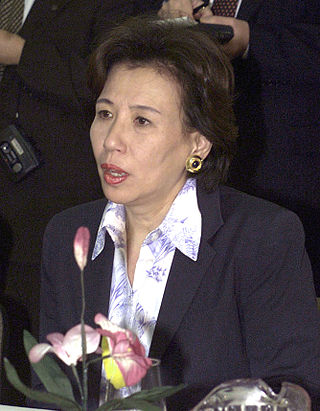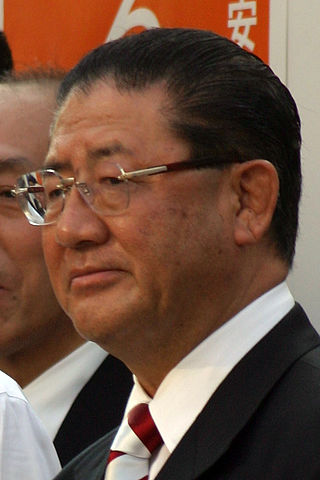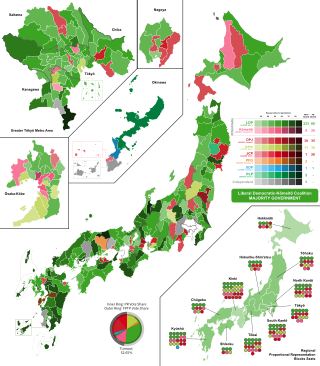
The Democratic Party of Japan was a centrist to centre-left liberal or social-liberal political party in Japan from 1998 to 2016.

Makiko Tanaka is a Japanese politician. She is the daughter of former Prime Minister Kakuei Tanaka and his official wife Hana.

Taku Yamasaki is a Japanese politician who served in the House of Representatives from 1972 to 2003 and from 2005 to 2009. He directed the Director General of the Japan Defense Agency for two months in 1989, and served as Minister of Construction from 1991 to 1992. He was a prominent faction leader in the Liberal Democratic Party (LDP) during the late 1990s and early 2000s, and served as its Secretary-General and Vice President under Prime Minister Jun'ichirō Koizumi.

The New Party Nippon was a Japanese political party formed on August 21, 2005. The party was headed by the former Nagano governor Yasuo Tanaka, and includes Diet members Kōki Kobayashi, Takashi Aoyama, Makoto Taki, and Hiroyuki Arai, who left the Liberal Democratic Party in opposition to Prime Minister Junichiro Koizumi’s postal privatization drive.
This article presents detail of the results in the 2005 Japan general election, breaking down results by block district. The 11 block districts elected 180 members by proportional representation, and 300 members were elected from single-member districts distributed among the 47 prefectures.

The New Party Daichi is a Japanese political party. The party works based on jurisdiction and administrative divisions. The party's leader is Muneo Suzuki, a former Representative for the Liberal Democratic Party (LDP) who is currently a member of the House of Councillors caucusing with the Nippon Ishin no Kai.

General elections were held in Japan on 20 October 1996. A coalition of the Liberal Democratic Party, New Party Sakigake and the Social Democratic Party, led by incumbent Prime Minister Ryutaro Hashimoto of the LDP won the most seats.

House of Councillors elections were held in Japan on July 29, 2007. The date was originally to be July 22, but the ruling Liberal Democratic Party (LDP) decided in mid-June to extend the session of the House for a week to finish up legislative business; this step was criticised due to the short-term delay.

House of Councillors elections were held in Japan on 29 July 2001. They were the first national elections since Junichiro Koizumi became Prime Minister after Yoshiro Mori resigned in April 2001. The Liberal Democratic Party (LDP) and its election allies, were the major winner, provided Koizumi a strong mandates to move forward with his reform policies. The ruling coalition performed well, and regain their majority in the House of Councillors.

Kaoru Yosano was a Japanese politician. He was a member of the Liberal Democratic Party (LDP), the Sunrise Party of Japan and former member of the House of Representatives, serving his ninth term in the Lower House representing Tokyo's first electoral district until his defeat in the 2009 Japanese general election. He was Chief Cabinet Secretary to Prime Minister Shinzō Abe from August 2007 to September 2007, and Minister of Economic and Fiscal Policy in Tarō Asō's administration from February to September 2009.

Factions are an accepted part of the Liberal Democratic Party (LDP), the ruling party of Japan, which began with eight formal factions when it was first formed by merger in 1955. A political faction may be defined as a sub-group within a larger organization. While factions characterize other political parties in Pacific Asia, Japanese factionalism is distinguished by its stability and institutionalization. Although factions reconstitute themselves from time to time, the habatsu active today can be traced back to their 1955 roots, a testament to the stability and institutionalized nature of Liberal Democratic Party factions.

House of Councillors elections were held in Japan on July 11, 2010. In the previous elections in 2007 the Liberal Democratic Party (LDP) had lost its majority to the Democratic Party (DPJ), which managed to gain the largest margin since its formation in 1996. The House of Councillors is elected by halves to six-year terms. The seats up for election in 2010 were last contested in the 2004 election.
The Sunrise Party, formerly known as the Sunrise Party of Japan, was a conservative and nationalist political party in Japan. The SPJ was formed on 10 April 2010 by five Japanese lawmakers and parliamentarians, four former members of the Liberal Democratic Party (LDP) and an independent politician. It was named by the then-Tokyo Metropolitan Governor Shintarō Ishihara who supported the action. At its inception, the party described itself as an "anti-DPJ, non-LDP" political force.

Hokkaidō 5th district is a constituency of the House of Representatives in the Diet of Japan. It consists of Atsubetsu ward and a portion of Shiroishi ward in Hokkaido's city of Sapporo and Ishikari Subprefecture excluding Sapporo and Ishikari city. As of 2009, 453,752 eligible voters were registered in the district.

General elections were held in Japan on 14 December 2014. Voting took place in all Representatives constituencies of Japan including proportional blocks to elect the members of the House of Representatives, the lower house of the National Diet of Japan. As the cabinet resigns in the first post-election Diet session after a general House of Representatives election, the lower house election also led to a new election of the prime minister in the Diet, won by incumbent Shinzō Abe, and the appointment of a new cabinet. The voter turnout in this election remains the lowest in Japanese history.
A by-election for the Hokkaido-5th seat in the Japanese House of Representatives was held on 24 April 2016, coinciding with another by-election in Kyoto. The by-election was triggered by the death of the sitting member, former Speaker of the House and Foreign Minister Nobutaka Machimura from cerebral infarction in Osaka on 1 June 2015. Machimura, a member of the Liberal Democratic Party, was a long-serving representative for the district, holding the seat almost continuously between 1996 and 2015. The seat has been considered safe for the LDP, with Machimura retaining it on a 14.1% margin in the 2014 general election.

Minoru Kiuchi is a Japanese politician and former Ministry of Foreign Affairs official, who had been an independent candidate for most of his political career but has run for office as an LDP candidate since 2012. He has served as state minister for foreign affairs and state minister for the environment. Kiuchi is known for his close ties with Germany and his German language skills.













